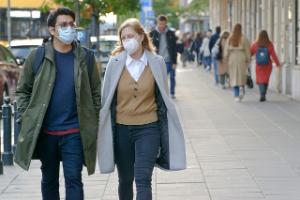News
COVID-19 related deaths higher in deprived areas globally

Fuse researchers from the NIHR School for Public Health Research (SPHR) have found that COVID-19 related deaths across the world were higher in areas of socioeconomic disadvantage, in a new international review published in the Lancet Public Health.
The academics have also called for urgent additional support for the NHS ahead of a possible 'twindemic' of flu and COVID-19 this winter in England.
The results add evidence to the growing picture of an unequal pandemic resulting from inequalities in the social determinants of health. Globally, COVID-19 has exacerbated existing inequalities among the most socially disadvantaged and reducing these inequalities requires long-term action.
The COVID-19 pandemic took place against a backdrop of social and economic inequalities. Research from England had found large regional inequalities with high rates of COVID-19 deaths in the most deprived northern regions. However, there has been no assessment of whether there was a similar association in other countries. So, in this new report, researchers sought to explore what is known about geographical inequalities in COVID-19 deaths globally.
The researchers reviewed 95 studies from across the globe and found extensive evidence of inequalities in COVID-19 deaths among those living in the most deprived areas. A large majority of these studies (86 out of 95) showed that during the first two years of the pandemic, there were inequalities at every level of geography – neighbourhood, town, city, region – people living in poverty had higher rates of COVID-19 deaths than their more affluent neighbours across the globe.
There was evidence of an association between COVID-19 deaths and area-level deprivation in four out of six global regions. Findings are in-line with data on area-level inequalities from other recent pandemics, for example H1N1 flu, Ebola virus and Zika syndrome.
Understanding the relationship between COVID-19 mortality rates and deprivation is complex. Deprivation is affected by wider social determinants of health such as housing, working conditions, unemployment, and healthcare access. This can cause higher exposure to the virus, for example people in low-income jobs may be less likely to work remotely and therefore less able to benefit from local lockdown restrictions and working from home. Self-isolation is also harder in overcrowded housing and densely populated areas.
“Our review provides clear evidence that those living in the most deprived communities shouldered the greatest burden from COVID-19"
Dr Victoria McGowan, Fuse Associate
Lead author on the study, Dr Victoria McGowan, Fuse Associate and Research Fellow at Newcastle University, said:
“Our review provides clear evidence that those living in the most deprived communities shouldered the greatest burden from COVID-19. The Levelling Up agenda in the UK has the potential to reduce inequalities between areas of high and low deprivation, this would go some way to preventing inequalities arising in future pandemics”
Co-author Clare Bambra, Fuse Senior Investigator and Professor of Public Health at Newcastle University, said:
“Our research shows that COVID-19 is an unequal pandemic. People in more deprived communities, globally and in the UK, have been most impacted with higher deaths. As we face a possible 'twindemic' of flu and COVID-19 this winter in England, additional support for the NHS in those parts of the country most likely to be adversely impacted should be considered as a matter of urgency. Health inequalities between the rich and the poor exist globally. Tackling this requires collaborative cross-government action, for example working with people who have lived experience of living in deprivation to develop effective solutions.”
This research was done as part of the SPHR Health Inequalities theme Equal England research project led by Fuse.
Read the full paper: COVID-19 mortality and deprivation: pandemic, syndemic, and endemic health inequalities.
News release adapted with thanks to the NIHR School for Public Health Research.
Last modified: Fri, 04 Nov 2022 10:41:51 GMT






